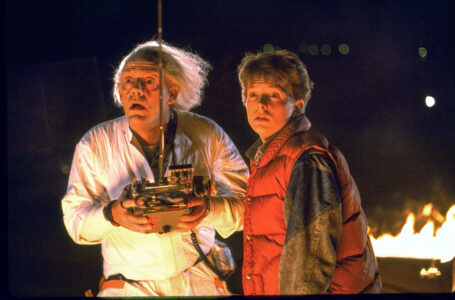‘A House of Dynamite’ is possibly one of the most important movies you’ll need right now

Once in a while, a movie will come along that will quietly and unassumingly change a viewer’s world perception. It won’t literally change the world, of course, it won’t necessarily be the best movie either. It will simply make us take a harder and deeper look at our world around us. “A House of Dynamite” is one of those movies. Kathryn Bigelow’s taught, edge-of-your-seat thriller plays on our nerves relentlessly from start to finish.
During a routine morning in the White House Situation Room, as various intelligence and military staff go about their daily tasks of protecting America, there is, suddenly, an air-borne nuclear missile detected high up over the Pacific, which appears to be in-bound to the U.S. mainland. From here on, the viewer is pulled along in what can only be described as a countdown to a possible full-scale apocalypse.
The movie plays out in three chapters — as there is just a little over 18 minutes until the impact. Bigelow has cleverly constructed the story within these three chapters, each covering different perspectives from different parts of the country as the same countdown ticks away. I am not giving anything else away about the plot, mainly because that is it, and all the more powerful it makes it too. The two-time Oscar winning director has reigned in all her experience to perfect this movie and all aspects of its delivery from script to screen.
Well known for her military and politically based movies, such as “K-19: The Widow Maker (2002)” “The Hurt Locker (2008),” for which she still holds the record as the only woman ever to win an Oscar for directing, and “Zero Dark Thirty (2012),” Bigelow’s attention to every detail and nuance of a character’s position within the story creates an exceptional emotional arc that, in the wrong directorial hands, would have created a lesser and more flippant cinematic experience for the viewer. She has taken the very short amount of time that the actual story takes place in and has managed to not only prolong the impending doom of the moment, but has made the characters, all professional and hard-nosed in their specific jobs, become us — all of us.
Ever since the atom bombs were dropped on Hiroshima and Nagasaki, Japan, in 1945, that brought about the end of World War II, the threat of all out global nuclear war has loomed over the entire world, foreboding the complete annihilation of mankind for each generation since.
We all know and have come to learn that, in the event of a nuclear attack of any kind, there will be no winners as the devastation would be absolute. Many movies and TV shows have depicted a post nuclear war world as one of sheer nightmares and horrible deaths brought on by radiation fallout. That is if you are unlucky enough to survive the initial blast. This is all of us — a collective dread at the mere thought of it — the loss of everything and everyone in an instant is, quite simply, unthinkable. Bigalow has managed to convey this dread, in just a few short minutes and through a handful of characters, she has managed to make us feel the moment in all its terror.
Each character, brilliantly acted by all, and superbly directed by Bigelow, unravels emotionally in very different ways, but in ways we all immediately understand, accept and recognize. That is where this movie triumphs, not in any technical delivery, great as that is, and not in any manipulative storytelling. No, the power is how the humanity in everyone is thrust to its limits as the possible “end of us all” scenario creeps ever nearer and shock becomes fear and fear becomes hopelessness in all of them, in different yet equally powerful ways.
The ensemble cast, led by Rebecca Ferguson, Jason Clarke, Anthony Ramos, Jared Harris, Tracy Letts, Gabriel Basso and Idris Elba as the president, are all brought together brilliantly in a world that, at first, shows their mundane, wonderful lives, so taken for granted, suddenly colliding with the actual “what if” playbook possibly becoming a reality. One they have only ever trained for, but never believed they would face in such a viscerally frightening way.
For screen writer Noah Oppenheim, this has been the culmination of many years of experience working and writing within TV journalism and covering many political events over his time.
In 2017 he was made president of NBC News, after many successful years running various news shows on that network. His vast knowledge of politics and the day-to-day processes of the government and the political world in general had begun to fuel his interest in fiction writing.
His experience covering global nuclear tensions and, in particular, the fragility of nuclear deterrence, put him in good stead to write “A House of Dynamite.” His previous political writings, the movie, “Jackie,” (2016) starring Natalie Portman and, more recently, the Netflix series, “Zero Day,” (2025) starring Robert DeNiro, were both received well. But it is this movie that is garnering a lot of interest within award circles, some saying he will be guaranteed an Oscar nomination, which we of course will have to wait and see. I agree that he will certainly be nominated for many awards this year, and well deserved they will be too. The script is sharp, poignant and cuts directly to the heart of the sheer life altering moment that a ‘what if’ event like this could look like if it occurred.
The movie has generated some interesting discourse regarding the truth of how a situation like this would play out in the real world, or whether it could even happen at all.
Bigelow and Oppenheim were very meticulous in their preparation for telling this story. Oppenheim himself received the input of several high-ranking military officials, some of them had worked in the specific positions depicted in the movie. He believed that he had, as accurately as possible, played out the scenario in realistic terms.
Some had criticized how a nuclear missile could just appear in the sky out of nowhere, especially when there are very sophisticated early warning systems in place throughout the globe. Confidence in the USA’s SBIR (space-based infrared satellites) system, makes it very hard for a nuclear missile to suddenly appear out of nowhere, but not impossible.
Oppenheim kept finding that, despite this general confidence in those systems, many of the people in the know that advised him were never able to be 100 percent confident and that worried him enough to write the story with that in mind. He decided to concentrate on the potential human failings in such a moment, on how, as he stated, “even the most competent and prepared authorities can come undone by chaos.”
He wanted to also, “examine and interrogate the system itself, rather than assigning blame to a single villain.” This has made it all too familiar to the viewer, more understandable, more realistic, closer to home and, in doing so, making it almost too scary to imagine.
This is a thriller of first-class quality, simply because it plays on our inherited fears of what a nuclear strike would mean to us all, how we understand the power of such weapons, and how the sheer madness of such an attack would literally turn our world upside down.
It is hard to imagine the unimaginable, but we do and we have, and no matter how you might play it in your head, the outcome can never be more than the worst kind of nightmare. How would you react in those 18 minutes? This movie gives us a stark view of how we might react and, thanks to the brilliant directing, acting and script, makes it all the more terrifying.
“A House of Dynamite” is currently streaming on Netflix after a limited cinema release run.
— — — —
Roy Morris is an entertainment columnist for The Express.




